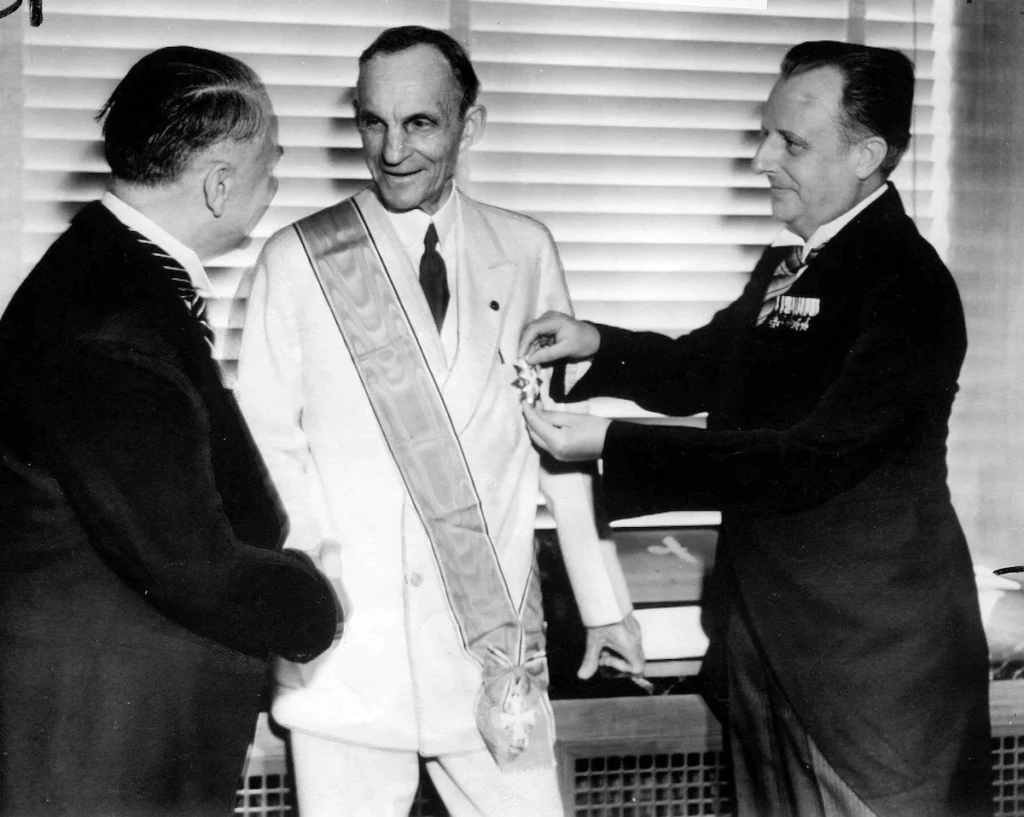What About Henry Ford?!
Do his achievements and good works outweigh his virulent antisemitism?

In an op-ed for the Washington Post, Detroit-based writer Rebecca Sonkin muses, “Kanye West’s antisemitism is bad for business. Now how about Henry Ford?” Given that the tycoon died 75 years ago, I was expecting something rather eyeroll-inducing. Instead, it’s a niche local issue:
Henry Ford, the most prominent, virulent antisemite the nation has ever known, is omnipresent in Detroit. Yes, Ford is famous for implementing the moving assembly line and founding the automaking business that put the Motor City on the map. But Ford was also a powerful driver of anti-Jewish hatred, using his wealth and influence to promote antisemitism in the interwar era, before World War II and the Holocaust.
Ford, a friend wrote in his diary in 1919, “attributes all evil to Jews or to the Jewish capitalists.”
To advance his views, Ford had purchased the Dearborn Independent newspaper in 1918, which soon began publishing a weekly front-page column, “The International Jew: The World’s Problem.” It ran for 91 issues of a paper that, at its peak in the mid-1920s, claimed a circulation of 700,000 to 900,000, distributed across the country at Ford auto dealerships.
In that period, Ford also paid for the printing and distribution of 500,000 copies of “The Protocols of the Elders of Zion,” a stubbornly persistent forgery that purports to describe a Jewish plot for world domination.
For these efforts, Adolf Hitler praised Ford by name in “Mein Kampf” and in 1938 awarded him the highest Nazi honor bestowed upon a non-German. Although Ford had apologized for his antisemitic campaign in 1927 amid mounting public criticism — his remorse was met with much skepticism — he gladly accepted the honor.
Today, how is it that Ford’s malevolence toward Jews is dwarfed in Detroit by the urge to celebrate his automotive achievements?
Honestly, it’s always hard for me to square these things. On the one hand, Ford all but started the American automobile industry and was surely the leading force in turning Detroit from a sleepy town of 285,704 people in 1900 to a city of 1,849,568 three years after his death. The industry employed huge numbers of people in good-paying jobs for decades. And he was a massive philanthropist even by the standards of the uber-wealthy of his day. On the other, he fomented a horrible ideology that made life worse for a lot of Americans, in Detroit and elsewhere.
While he explicitly declaimed violence against Jews, his works were celebrated by the Nazis and are said to be a major inspiration for Hitler’s vision. By that time, Ford had long since apologized and recanted his views but most believe that was because of economic and social pressure, not actual remorse. And, while his mental state was said to have diminished by a series of strokes, he nonetheless accepted a medal from Hitler’s government not long after Kristallnacht.
It seems weird to celebrate such a man but he was celebrated along with Founding Fathers and Presidents on US postage stamps in my lifetime; indeed, within my early memory and inducted into various halls of fame as recently as 1996.
That Detroit still has a lot of monuments to his name isn’t shocking. But I can understand Sonkin and others being uncomfortable with that.






I think you approach it like you approach anyone – human beings are flawed, imperfect creatures who sometimes do bad and/or stupid things. Nobody ever benefited from segmenting out snippets of history for analysis and examination, even less so by defining something as deep as the human experience by a single factor, so approach Ford like any other historical figure – in the entirety. He did some amazing things for industrial production and the US auto industry, and he held some hurtful beliefs that led him to do some stupid things. Neither of those negates the other. Both are worth remembering.
What’s the saying, Clay footed gods? It’s impossible to square brilliance and achievement with horrible, destructive attitudes. One can only recognize the former while not hiding the latter.
There’s a massive difference between how we ought to deal with a figure who’s long dead versus one who’s very much alive and still continuing to propagate his toxic views. You may or may not be able to “forgive” Ford today, but he’s no longer still around spreading anti-Semitic ideas, nor is his company, so it’s not like you’re contributing to anti-Semitism in the world by purchasing a Taurus today. But purchasing one of Kanye’s records does put money in his pockets. Making deals with him as a company does aid his ability to influence people in the present day. There’s a vast difference in harm we’re talking about here.
And let’s keep in mind: Adidas, the company that dropped Kanye after significant public pressure, was founded by Nazis.
Now do Hemingway.
@Kylopod:
The evidence on that one is tenuous, to be honest about it, and devolves as much to interfamilial squabbles and sibling rivalry as it does to overt acts. Believe me, given my family history, you’d be hard pressed to find anyone that detests Nazism and Nazis more than I do, and I by no means wish to be an apologist, but I think we have to draw a line between active participation in / responsibility for the atrocities and nominal membership in the party itself. If we start drawing lines based on the latter, we’d have to condemn basically an entire generation.
@HarvardLaw92:
His achievements are worth remembering but in context. He is not worth celebrating.
We have a real problem in this country with conflating achievements with goodness. We expect talent and success to be synonymous with worth and goodness despite myriad examples of really terrible people achieving great things.
In Ford’s case, we should recognize his contributions to industry and to Detroit but without statues, monuments and celebrations of the person.
His views were just not that exceptional. He was a 19th-century Protestant in America, and he was not that different than a Wall Street banker except that he had to worry about unions and Communists on the factory floor. He didn’t only hate Jewish people. He thought that unions were part of the Jewish conspiracy. But most of Protestant America had similar thoughts about foreigners. They just weren’t able to fund their own newspaper.
Aside from being Detroit based I’m not sure why Sonkin went after Ford. There doesn’t seem to be any current move to take his name off stuff or anything. He’s a good example of how common antisemitism was, but hardly the only one.
A lot of this mystifies me. I guess I don’t share the Manichaean need to sort things into good or evil. Ford did some good things. He also did some bad things. Some really really bad things, many of which had nothing to do with antisemitism. Us liberals are supposed to be able to do nuance. Condemn the bad stuff and praise the good stuff.
I can’t get excited about, say, Robert E. Lee statues. But I can certainly understand how a Black person would feel more strongly. It’s just a hunk of stone or a lump of bronze. He was a good general in a bad cause. So was Irwin Rommel. I don’t think even Germans put up many statues of Rommel. And nothing in the Constitution says anything about changing our minds about a statue.
And one can listen to Ye’s* music and wear his shoes while recognizing that in a broader political context he’s ignorant as a stone. And one can recognize that the shoe company dropped him like a hot rock because he made himself bad for business, not because they’re woke.
* Maintaining my usual policy of calling people what they want to be called, even if it feels silly.
In Ford’s case, we should recognize his contributions to industry and to Detroit but without statues, monuments and celebrations of the person.
As an achievement, Fordism seems to have ambiguous results for those who aren’t the owners. Two generations of factories was all it took for industrialization to wane in this country. This happened for many reasons, but one was that the workers did not find it fulfilling and that a vast counter-cultural rebellion happened because of the products and lives it produced.
I think it is useful to understand both sides of a person like Ford in the context of the times he lived in. Yes, he was a great industrialist but, as a anti-Semite and a fascist, he was a danger to the country. If WWII didn’t happen he would’ve done what the German economic elite did when they threw their weight behind Hitler. We took a different path only because the “class traitor” Roosevelt and WWII blocked that path. We lucked out, quite frankly.
@gVOR08: Statues of Robert E. Lee and other Confederate figures is a different issue. Statues don’t just record history, they commemorate it. How would you react to a statue of Hitler or Stalin or Genghis Khan? Also, with Lee, unlike with Ford, it’s hard to separate any sort of legitimate achievements he had from the negative stuff. It’s not like some great businessman or inventor or whatever who happened to hold racist views. The racism is central to his legacy and why he’s remembered at all.
@gVOR08:
You are indeed mystified, but it isn’t because you don’t like binary sorting. You just aren’t appreciating, or subject to, the consequences of not responding to the hate being spouted.
When Chapelle offers up antisemitism or transphobia, you have the luxury of not caring. Trans-people and Jews have to face the wave of bigotry and hate that his comments engender and promote.
@SKI:
That’s just it though – we aren’t celebrating goodness. We’re celebrating achievement, and every statue raised of the man (who I admit I find odious) is an opportunity to tell the whole story – the good and the bad. Maybe it’s a product of my own family history, but I’ve come to the conclusion that sanitizing history is not the answer. If we relegate the bad to the cupboards, never to be spoken of, we fail to learn from it.
So sure, put up as many statues of Ford as you want, and when people ask why – as they always do – tell them the story. The whole story.
@gVOR08:
Nuance works only when the person is real. And it’s our job as humans to create these people and not to have a heroic statue of a guy who also bought and sold human beings. There is no actual space between the two points. And over time either the slaves will beat the statue or the statue will eliminate the slaves. You can’t have both.
@HarvardLaw92: The Dassler brothers joined the Nazi party in 1932. I know of no evidence that they were true believers; more likely, it was a requirement for staying in business.
Why don’t we just rename him Edsel New Coke Trump Ford?
@HarvardLaw92: You are confusing museums which can tell nuanced stories with statues that don’t. Statues of people tell a single message – we are (literally) idolizing this person. That is their point and their reason for being.
_________
@gVOR08:
The reason why his ignorance matters is stories like this: “‘Kanye was rite’: Jewish cemetery vandalized with swastikas in suburban Chicago“
@HarvardLaw92: I am reminded of something somebody somewhere said:
“What do call someone who joined the Nazi party for business reasons? A Nazi.”
@SKI: I would just add that a lot of people fail to understand the close relationship between conspiracy theories and anti-Semitism. In a sense, the ultimate conspiracy theory–the grandfather of all modern ones–is the Protocols for the Elders of Zion. (Which Henry Ford heavily promoted.) I’m not saying all conspiracy theories are anti-Semitic. But if you look at practically all the big ones–9/11, flat-earth, anti-vax, 2020 election, and more–you invariably find significant chunks of the movement who are open anti-Semites. In these theories, there’s always some shadowy group secretly controlling society. It’s what they’re always gesturing at with that all-encompassing pronoun “they,” found in sentences like “That’s what they want you think.” This group isn’t always explicitly identified as “the Jews,” but it maps very easily onto that belief.
The other day Nick Fuentes, somewhat echoing Kanye, blamed the disappointing midterm results on the Jewish media. If you listen to more mainstream Republicans, the rhetoric is virtually indistinguishable from that of Fuentes or Kanye, it’s just that they substitute other words for Jewish media–they talk about the deep state or the libs or the elite or whatever. Recently Tulsi was on Tucker and she said (this is an exact quote) that she left the Democratic Party because it’s “now under the complete control of an elitist cabal of warmongers driven by cowardly wokeness, who divide us by racializing every issue and stoke anti-white racism.” This is literally indistinguishable from neo-Nazi rhetoric, with the sole exception that she never uses the word “Jew.”
Many liberals, unfortunately, don’t take anti-Semitism very seriously today because they think it’s the old prejudice, the one that’s increasingly outdated and irrelevant, as Jews have moved into a comfortable place in society while other groups are bigger targets. (Conservatives, meanwhile, don’t take it seriously unless it’s couched in terms of “defending the state of Israel.”) I think there’s actually some truth to that–I think, say, trans people are in much bigger immediate danger in modern America than Jewish Americans. But anti-Semitic beliefs are still very much alive and well, and they underlie a lot of the bigoted beliefs directed at other groups. The Pittsburgh shooter was triggered by the so-called caravan of migrants, which he blamed on the Jews. That’s how these things always work out–racial and other minorities are gaining increasing power in society, and it’s the Jews’ fault.
@gVOR08: I feel like celebrating Lee is a slap against every decent person. I think the key is “decent” not “black” although being a particular target does crystallize one’s reactions. What I think is a reality is that most people aren’t celebrating the actual Lee (or Ford or Columbus) but rather a two dimensional image they have in their head. I don’t see much point in berating people who celebrate him if that’s the case. It’s the League of the South types, i.e. the ones who know exactly who Lee was and celebrate him because of that, that I find reprehensible.
@OzarkHillbilly:
I suppose. I draw the line differently. To me, Nazis are the people who sent my family up a chimney. Some guy trying to keep from losing his business just doesn’t merit the same degree of disgust, at least not from me anyway.
@HarvardLaw92: Speaking of the problems with telling the “whole story” of Henry Ford…
Henry Ford and the Jews, the story Dearborn didn’t want told
@SKI:
We will have to disagree I suppose. No harm in that.
@SKI:
And, lo and behold, the Streisand Effect appears to be handling that one rather well, no?
@Kylopod: Yup.
There was a great long-form piece, maybe a year or two ago, on how antisemitism is often a foundational element in anti-black activity today. That it serves as the conspiracy-theory foundation for the worldview of bigots and violent extremists.
My own suggestion for things like Confederate statues etc. is to put up another plaque pointing out that the damn thing was put into place far after the Civil War and was a part of the backlash called Jim Crow. Or if it’s a statue of Christopher Columbus, that he was a slaver and ended up exterminating entire tribes of indigenous Americans. If people really really hate having the statue on public property, create a history museum and move the statues (plus explanations) there.
People are complex, and 99% of us adhere to the beliefs of the culture we grew up in. I suspect that a lot of us like to think that if we were back during the period of the Civil War in the South we wouldn’t have fought for separation and would have been “one of the good guys”.
I have a Polish war criminal in my family on my father’s side, so am not so certain of my historical righteousness. It would have been nice to believe, were I somehow catapulted back into Nazi Germany, that I would have immediately joined the Resistance. The fact is, I probably would have done what 99% of people do during times of social chaos: kept my head down, done the bare minimum necessary to appease the authorities, and tried to be as inconspicuous as possible.
It’s interesting to see where people draw the line, and it turns out to often be a pretty blurry line.
As for myself, I’m comfortable with the idea that historical figures can and do have good and bad sides. You’re not going to find any major historical figure who is free from sin, as defined today. As far as I’m concerned, communities are free to make these decisions without my input, so I have no self-righteous view on what Detroit should do.
Here in Colorado, where I have more of a stake, similar things are going on, and the most notable is the desire to rename Mount Evans – one of the most prominent peaks on the Front Range. It’s currently named for John Evans, the second governor of the Colorado territory (pre-state Colorado), who was forced to resign due to his involvement in the Sand Creek Massacre. The Colorado legislature named the mountain after him in 1895
There’s a renaming commission here in Colorado now and Mt. Evans is very likely to see a name change. The historic name, Mt. Rosalie, is an option and my choice, but there are others.
There is also an effort to excise “squaw” completely. And just now, I noticed that the Colorado government naming board website refuses to even name that word, treating it like the N-word and not spelling it out.
There was also a law passed to remove any Native American mascots from schools in the states. But in my view, it’s way overly broad as they even consider names like “Thunderbirds” to be offensive. To me, removing all Native American references is basically whitewashing and dumb.
@OzarkHillbilly:
Oskar Schindler was a member of the Nazi party and was a spy for Nazi Germany until 1942.
Ford needed employees.
Ford recruiters went to the Appalachians and brought all those undereducated poverty-stricken folk up to Detroit.
Suddenly, without an education you could make a huge (relative to their previous experience) salary and live a life.
And generations that followed did not pursue higher ed, as they could get a job “on the line” and afford the home and boat.
and they were the ones that were ready with their shotguns in 1967, to “keep them n****ers down”.
And the corporations did exactly that as well, with white flight & urban core abandonment. The city fell to a population of under 1 million resulting in the collapse of infrastructure and abandonment of huge numbers of neighborhoods.
Let me just say Ford did Detroit no favors. To “just” talk about his anti-Semitism is to overlook the destruction of a city.
When I traveled, people asked me why I lived in Detroit. I said: “The tickets are always cheaper round-trip” (said with a smile). But when you grow up in America’s only third-world city, the rest of America is like Disneyland. (oops… another anti-Semite there.)
Coming home was gritty, ugly and normal.
(Note: I grew up in a Ford row home, on the Detroit / Dearborn border, not far from the Rouge plant. )
I think it works on roughly the same principle that will cause some future student who stumbles across this article while writing a paper about Henry Ford to ask “Kanye who?” Achievements are way more visible. For the most part, that’s a good thing. Most of us probably would rather be recognized for what we accomplished than for who we are.
@Liberal Capitalist: Detroit always impressed me as one of the first large U.S. cities to undergo the urban equivalent of mad cow disease. People left, but they didn’t leave from locations inversely to how Detroit grew–which meant Detroit had fewer and fewer people to pay taxes but had to still maintain the standard city infrastructure (lights, water, roads, schools, and other services) over the entire landscape.
Kanye’s views got millions and millions of dollars of free amplification by the same Woke Wurlitzer that got Trump elected.
Media driven “awareness” of Racism and Anti-Semitism doesn’t have the same effect as it did it times past–probably because they are overused to shout down practically everything. Racism used to mean [mostly] a person thought blacks were inherently inferior to whites–now it means a sh*t ton of things.
These discussions are having the opposite effect that Academics believe they are having. “The streets” (both black and white) are actually rallying to whoever the media tries to shame or call out. Knowing this–celebrities and socialites are only going to double down and repeat the cycle of amplification to gain new followers.
Do people want to achieve their objective— or be right.
@Andy:
The myths that communities create can end up affecting all of us.
The Southern myth of the Lost Cause and the War Of Northern Aggression with the whole States’ Rights thing continues to play out to this day. The myths of the Wild West continue to reverberate as well.
“Remember The Alamo” but don’t remember that it was the Texans seceding from Mexico to protect slavery.
I think Americans have been encouraged to forget how much of the wealth class was lined up to support Hitler before WW II, and how they used their wealth to mold public opinion. Whether this has any relevance to today, I suspect the answer is clear.
@gVOR08:
Re:
I share the same affliction. Most people do not so people like us must be careful about what we say. What if Hitler had survived and, say, his government had invented a cure for cancer? A debate on whether he would thereby be either good or bad? Strikes me as wrong headed at best, probably idiotic.
Henry? We can not judge people of the past with today’s norms. Once upon a time conquering armies slew whole populations of cities which resisted them and thought nothing of it. The bible proudly announces the slaying of everybody in Jericho by the heroes, the Israelites. Yesterday’s heroes are today’s war criminals. Anti semitism was a popular and prevalent sentiment across the history Western civilization. Hardly anyone gave a damn about Ford’s anti semitism at the time he spewed it.
Where the people who burned witches evil or ignorant? Does anyone think a time machine which brought those people as infants to this time think they would’ve grown up with a view that witches must be burned?
Good and evil…Reminds me of an old cop who liked to tell people he would give them $10.00 for every evil thing which he saw go down in the course of his career of you would give him a nickel for everything truly stupid.
@dazedandconfused:
What strikes me as idiotic is thinking that overseeing a government that invents a cure for cancer says anything about someone’s character. There is no debate.
This is not quite as stupid but also ignorant. Ford’s view were considered wrong in his own time. It is why he “apologized” in 1928 for his antisemitism (though he accepted Nazi Germany’s award for them years later).
From the link above:
Excusing bad acts in the past as “of its time” almost always ignores that there were people at that time who knew it was wrong.
@SKI: @SKI:
Point taken there was some kick-back, but then again I did say “hardly anybody”. The criticism was from mostly Jewish people, who were about 1% of the nation’s demographic at the time. Ford, in his auto biography recounted how anti-semitism was common in the Dearborn of his youth.
I believe my point may have escaped you. It’s the good/evil v ignorance question. I had thought I had made that clear. Did you know General Grant was an anti-semite?
@Andy:
FWIW, that’s the prevailing modern approach to the word in Native American and First Nation communities.
https://en.wikipedia.org/wiki/Squaw
@dazedandconfused:
If it truly was “hardly anyone”, he wouldn’t have felt he needed to apologize or stop printing the paper. A boycott by “hardly anyone” wouldn’t have been noticed, let alone impacted behavior. So, again, historical reality (and common sense) is in conflict with the claims that only the Jews cared.
Yes, I knew General Grant was an antisemite. What of it? You seem to think that recognizing that humans are multifaceted and life is nuanced escaped me. Hardly. That isn’t the profound thought you seem to think it is.
And recognizing that reality, that good people do bad things or have bad ideas, doesn’t excuse the bad thoughts or ideas. Similarly, recognizing that evil people can make positive contributions, doesn’t make them somehow not-evil.
@Kylopod: Broad simplistic brushes…
Adidas was founded by a brother who during the Nazi period seems to have simply been an amoral trend rider, Nazi youth orgs loved sport, sold more that
The Adidas founding brother
Not really the Nazi True Believe profile. More the opportunist profile
Contextually on the other hand his elder brother who founded Puma (and was ex police man profile… patterns there) perhaps had real inclinations.
@Lounsbury: The “he’s not a pedophile, he’s an ephebophile” defense…
@Gustopher:
You really needed a CRT Trigger Warning for that, but yeah, good point.
@Gustopher:
No, they can’t.
While I agree that Ford was a racist douchebag and Confederates were traitors (etc.), I don’t have much ability or interest in trying to micromanage the wrongthink in places where I don’t live and given contexts that I don’t fully understand. Is this statue racist or not? Does X have the right context or not? I don’t presume to be able to make such judgments, so I’ll stick with what I know, which is stuff happening here in Colorado.
In short, I trust that the people of Detroit will figure it out on their own, and I’m skeptical that outsiders lecturing online will positively promote that process.
@mattbernius:
The only problem I have is the increasing tendency to refuse to print offensive words even in a mention context. What surprised me is that a Colorado government website did this with squaw, ie. “Sq___”
@SKI:
We disagree that those in history who held wrong views common to their time must be deemed evil or are being “excused”. Analysis and advocacy are not the same things.
I know. If your point is that he saw the light and rescinded his previous actions, I agree. If however you think that absolves him of his sins….
Well, that’s between God and him. I on on the other hand am not quite so forgiving.
Well, I ain’t perfect, but I’m comfortable with my accomplishments as well as who I am. I never came close to perfection, but I tried to be better. That is the best I could hope for.
OK folks, here’s my point:
Somebody who was willing to profit off of slave labor but drew the line at sending people to the ovens? Yeah OK , they weren’t Heinrich Himmler. That doesn’t make them Saint Francis. And they were still Nazis.
And ftr I’m not telling Jews where to draw the line, Lord knows they have the right to draw it wherever they see fit. But so do I.
I find it baffling and appalling that the atrociously racist Gone with the Wind appears high on many lists of ‘greatest American novels’. And they’re lists compiled in recent years, not in the 1930s (and even then, I’m sure many Americans would have found Mitchell’s racism grotesque and offensive).
@OzarkHillbilly: Spoken like the true American with easy facile judgement who has never lived under a totalitarian regime. As I have, I see rather more grey in the world and rather less black-and-white.
@Gustopher: The human being defence.
Comfortable armchair sanctimony is boring.
@Kylopod: What he wrote…